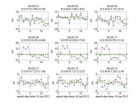(Press-News.org) Among older women, getting a mammogram every two years was just as beneficial as getting a mammogram annually, and led to significantly fewer false positive results, according to a study led by UC San Francisco.
The national study of more than 140,000 women between the ages of 66 and 89 appears online February 5, 2013, in the Journal of the National Cancer Institute.
"Screening every other year, as opposed to every year, does not increase the probability of late-stage breast cancer in older women," said lead author Dejana Braithwaite, PhD, a UCSF assistant professor of epidemiology and biostatistics. "Moreover, the presence of other illnesses such as diabetes or heart disease made no difference in the ratio of benefit to harm."
From 1999 to 2006, data were collected on 2,993 older women with breast cancer and 137,949 women without breast cancer – "the largest available screening mammography data set in the United States," according to Braithwaite.
The researchers found no difference in rates of late-stage breast cancer between women screened annually and women screened biennially.
However, they found that 48 percent of women between the ages of 66 and 74 who were screened every year had false positive results, while 29 percent of women in the same age range who were screened every two years had false positives.
"Women aged 66 to 74 years who choose to undergo screening mammography should be screened every two years," said senior author Karla Kerlikowske, MD, a professor of medicine at UCSF and a physician at the UCSF-affiliated San Francisco VA Medical Center. "They get no added benefit from annual screening, and face almost twice the false positives and biopsy recommendations, which may cause anxiety and inconvenience."
Braithwaite noted that the study "fills an important information gap, since accountable care organizations do not address screening intervals or screening cessation in women of advanced age or with a significant burden of illness."
She concluded that, taken together, "these results point to a need to consider life expectancy and co-existing illnesses in informing future recommendations about cancer screening in the elderly."
INFORMATION:
Co-authors of the study include Weiwei Zhu, MS, of the Group Health Research Institute, Seattle, WA; Rebecca A. Hubbard, PhD, of GHRI and the University of Washington; Ellen S. O'Meara, PhD, of GHRI; Diana L. Miglioretti, PhD, of GHRI and UW; Berta Geller, EdD, and Kim Dittus, MD, PhD, of the University of Vermont; Dan Moore, PhD, of UCSF; Karen J. Wernli, PhD, of GHRI; and Jeanne Mandelblatt, MD, MPH, of Georgetown University.
The study was supported by funds from the National Cancer Institute of the National Institutes of Health (CA150007, CA148577), the National Cancer Institute-funded Breast Cancer Surveillance Consortium (CA63740, CA86076, CA86082, CA63736, CA70013, CA69976, CA63731, CA70040, HHSN26120110031C), the American Cancer Society and the Agency for Healthcare Quality and Research.
UCSF is a leading university dedicated to promoting health worldwide through advanced biomedical research, graduate-level education in the life sciences and health professions, and excellence in patient care.
Follow UCSF
UCSF.edu | Facebook.com/ucsf | Twitter.com/ucsf | YouTube.com/ucsf
Mammogram every 2 years has same benefit as yearly mammogram for older women, UCSF study finds
Yearly test leads to more false positive results, say researchers
2013-02-05
ELSE PRESS RELEASES FROM THIS DATE:
Cargo container research to improve buildings' ability to withstand tsunamis
2013-02-05
Anyone who has seen the movie "Impossible" or watched footage from the Japanese tsunami has learned the terror that can strike with little warning. In those cases, when there is no time to flee, there may still be time to reach higher ground, called vertical evacuation.
But as you race to the third floor, how do you know if the building will hold up? Walls of water are not the only danger. Another potentially lethal challenge is water-driven debris - such as 60,000-pound fully loaded cargo containers - transformed into projectiles. Often pulled behind semi-trucks on highways, ...
Olive oil component alleviates intestinal ischemia and reperfusion
2013-02-05
Here's another reason why you should include olive oil in your diet: A new research report published in the Journal of Leukocyte Biology suggests that at least one compound in olive oil significantly reduces intestinal ischemia (restricted blood supply) and the resulting reperfusion injury (tissue damage caused when blood supply returns). The compound, called "oleuropein aglycone," is the most prominent polyphenol found in olive oil and could become a novel therapeutic target aimed at treating intestinal ischemia and reperfusion injury in humans. Ultimately, this research ...
Flexible classroom design saves money, improves flexibility, accessibility of instruction
2013-02-05
Researchers at North Carolina State University have developed a classroom design that gives instructors increased flexibility in how to teach their courses and improves accessibility for students, while slashing administrative costs.
Specifically, the new classrooms take advantage of the fact that students are bringing their own technology – such as laptops – to class. The classrooms also include mobile infrastructure, where whiteboards, desks and tables can be reconfigured according to the needs of students and instructors.
"These classrooms work really well in terms ...
Chest pain prior to a heart attack can protect the heart
2013-02-05
MINNEAPOLIS, MN – Feb. 5, 2013 – Patients who experience chest pain in the 24 hours preceding a heart attack, also called preinfarction angina, have smaller heart attacks and improved cardiac function in the contemporary cardiac stenting era, researchers found in a study published Jan. 22 in Circulation: Cardiovascular Interventions.
"Even before we began treating heart attack patients with angioplasty and stenting, physicians recognized that patients with chest pain prior to their heart attack seem to have better outcomes," says the study's senior author, Jay H. Traverse, ...
Precise Point Positioning and real-time positioning accuracy for COMPASS satellite navigation
2013-02-05
COMPASS uses the Geostationary Earth Orbit (GEO) and Inclined Geosynchronous Satellite Orbit (IGSO) satellites, which are more suitable for regional services. Its constellation is composed of 14 satellites, including 5 GEO, 5 IGSO satellites and 4 Medium Earth Orbit (MEO) satellites. As of 2012, 13 satellites have been launched. Except for G2 (unusable) and M1 (testing only), the remaining 11 satellites, including 4GEO+5IGSO+2MEO, have successfully transmitted signals and broadcasted navigational messages, to prepare for full operation starting in 2013.
Positioning accuracy ...
The zebrafish revealed a central regulator for the development of the brain histamine system
2013-02-05
Research has shown that mutations in the psen1 gene are common in the familial forms of Alzheimer's disease, and the Presenilin-1 protein that the gene encodes is known to be involved in the cleavage of the amyloid precursor protein. In Alzheimer's disease the amyloid precursor protein is not cleaved the normal way, and the protein accumulates in the brain damaging neuronal tracts and neurons. It is still unknown if the psen1 gene is involved in the etiology of Alzheimer's disease via another mechanism.
Professor Pertti Panula's research team at the University of Helsinki ...
Growth arrest in prostate cancer
2013-02-05
A previously poorly investigated signalling pathway is crucial for the growth and proliferation of prostate cancer cells. An international research team discovered this when studying the enzyme "soluble adenylyl cyclase" that produces the second messenger molecule cAMP. When the scientists inhibited the enzyme, the cancer cell proliferation was suppressed. The team led by Dr. Yury Ladilov from the Department of Clinical Pharmacology at the Ruhr-Universität Bochum reported together with colleagues from the Department of Urology at the RUB and the Cornell University in New ...
A review of the rapidly evolving field of topological insulator hybrid structures
2013-02-05
Topological insulators are novel materials that are insulating in the bulk but have surface states that are conducting. These surface states are topologically protected and possess several intriguing properties with the promise of potential applications. As a result, topological insulators have attracted many theoretical and experimental studies in the last few years. More recently, the potential of interfacing topological insulators with other materials with quantum states to make hybrid structures has been recognized and a slew of new studies are underway. Professor Jian ...
1 out of 4 lung cancer patients in Andalusia does not receive the radiotherapy they need
2013-02-05
A study conducted by University of Granada and Virgen de las Nieves U.H. researchers has revealed that in Andalusian public hospitals radiotherapy is provided to lung cancer patients with a frequency 25 % below that established by clinical protocols. Failure to provide such treatment results in a total of 3,000 survival-day loss for all lung cancer patients.
To carry out this study –recently published in the Journal of Thoracic Oncology–, the researchers reviewed the medical records and radiotherapy provided to all lung cancer patients in 2007 in the 12 Andalusian public ...
Seeing the software world from a dependency perspective
2013-02-05
Software development is a complex and difficult task. Software developers and researchers try to deal with software development in a simple way from multiple perspectives. This leads to the use of various kinds of models, including informal, semi-formal, and formal models, and all kinds of development methods, including informal and formal methods. In fact, every software development method contains multiple models from different perspectives. In contrast to an informal method, a formal method is considered to be a set of tools and notations (with formal semantics) used ...
LAST 30 PRESS RELEASES:
New knowledge on heritability paves the way for better treatment of people with chronic inflammatory bowel disease
Under the Lens: Microbiologists Nicola Holden and Gil Domingue weigh in on the raw milk debate
Science reveals why you can’t resist a snack – even when you’re full
Kidney cancer study finds belzutifan plus pembrolizumab post-surgery helps patients at high risk for relapse stay cancer-free longer
Alkali cation effects in electrochemical carbon dioxide reduction
Test platforms for charging wireless cars now fit on a bench
$3 million NIH grant funds national study of Medicare Advantage’s benefit expansion into social supports
Amplified Sciences achieves CAP accreditation for cutting-edge diagnostic lab
Fred Hutch announces 12 recipients of the annual Harold M. Weintraub Graduate Student Award
Native forest litter helps rebuild soil life in post-mining landscapes
Mountain soils in arid regions may emit more greenhouse gas as climate shifts, new study finds
Pairing biochar with other soil amendments could unlock stronger gains in soil health
Why do we get a skip in our step when we’re happy? Thank dopamine
UC Irvine scientists uncover cellular mechanism behind muscle repair
Platform to map living brain noninvasively takes next big step
Stress-testing the Cascadia Subduction Zone reveals variability that could impact how earthquakes spread
We may be underestimating the true carbon cost of northern wildfires
Blood test predicts which bladder cancer patients may safely skip surgery
Kennesaw State's Vijay Anand honored as National Academy of Inventors Senior Member
Recovery from whaling reveals the role of age in Humpback reproduction
Can the canny tick help prevent disease like MS and cancer?
Newcomer children show lower rates of emergency department use for non‑urgent conditions, study finds
Cognitive and neuropsychiatric function in former American football players
From trash to climate tech: rubber gloves find new life as carbon capturers materials
A step towards needed treatments for hantaviruses in new molecular map
Boys are more motivated, while girls are more compassionate?
Study identifies opposing roles for IL6 and IL6R in long-term mortality
AI accurately spots medical disorder from privacy-conscious hand images
Transient Pauli blocking for broadband ultrafast optical switching
Political polarization can spur CO2 emissions, stymie climate action
[Press-News.org] Mammogram every 2 years has same benefit as yearly mammogram for older women, UCSF study findsYearly test leads to more false positive results, say researchers

